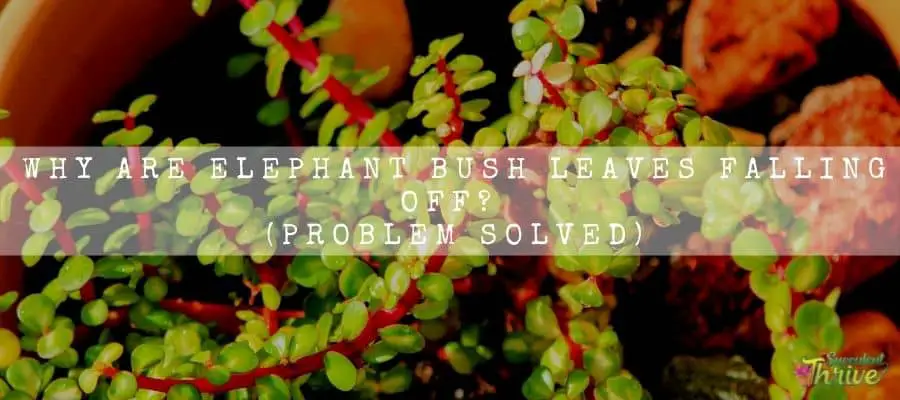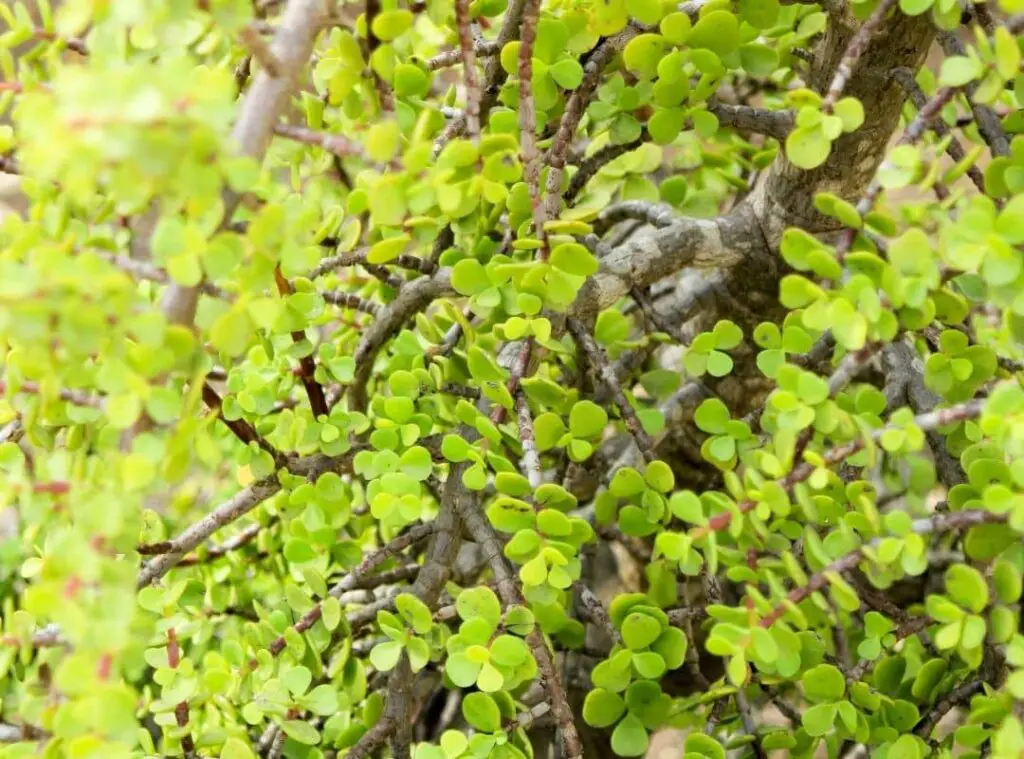Elephant bush leaves falling off is a common issue that many gardeners go through. If your elephant bush plants are dropping leaves, it could be an early sign of some other disease.
So, we are going to discuss the reasons which could affect this condition and how to prevent it
Elephant bush plant is used as a succulent garden shrub and as a bonsai plant. They are quite handy to use for indoor gardening and as well as for outdoor gardening.
To briefly touch on the appearance of the plants, they have round leaves which are small and fleshy to the touch, and they consist of a red stem. South Africans use this plant in their food recipes also.

Possible reasons for leaves falling off
Overwatering
Elephant bush plants could drop their leaves mainly due to overwatering. When you provide excessive amounts of water, it would avoid the plants absorbing sufficient levels of oxygen.
As a consequence of this, it will stimulate the fungal rot diseases in the plants. To ascertain whether your Elephant bush plants are suffering from over watering, you could simply check whether they contain any swollen or discolored leaves.
In case you come across these features, you need to immediately transplant them in fresh soil after removing the rotten parts of the plants.
On the other hand, under watering could also result shedding their leaves. When the plants are running short of sufficient water levels, plant leaves will wither and will end up falling on the ground.
Ideally you need to water them moderately in spring and fall and cut back on watering in summer. They actively grow in spring and fall and will be going into dormancy in summer.
When you water, ensure that you soak the soil with water and let them dry afterwards. ( Soak and dry method)
If you have grown them in an extremely fast-draining soil, it could also make the plants drop their leaves. If the soil mix is extremely fast draining, it will not retain any moisture in the pots.
If you spot your plants have become shriveled and drop the leaves that is because they are trying to conserve water. Leaves first start to fall off from the bottom part and the rest of the leaves will start to fall off.
Soil
Aside from underwatering and over watering, if you have grown the plants in a poor draining soil mix which is not enriched with required nutrients, it would also make the plants lose the leaves.
Hence, I suggest you go ahead with a succulent soil mix or with a cactus soil mix as these are beneficial for the optimal growth of the plants.
Unless you could make an appropriate soil mix on your own too. Succulents in general require excellent draining in the soil mix and elephant bush plants are no different to them.
f you think your plants are lacking that, you could consider adding elements such as perlite , pumice which would be helpful to better the draining of it.
Growing conditions change
Elephant bush plants do not prefer to get exposed to drastic changes in the growing conditions. If you suddenly expose the plants to a new growing environment, it will badly affect the plants.
Instead, you should gradually expose them to a new growing environment. If you leave them under drastic changes in the growing conditions, it will result in leaf drop.
When I say growing conditions , changes in the conditions such as lighting, temperature levels, humidity levels could be attributed to this condition.
Rain
If your plants are constantly getting rainfall, it would create high humidity levels around the plants and those conditions would be unhealthy for the plant’s healthy growth.
Lack of light
Elephant bush plants are quite demanding when it comes to sunlight requirements. They are fond of growing under full sunlight.
If you keep growing them in spots where there will be less exposure for sunlight, they will tend to shed their leaves.
It would be the same if there is a drop in temperature levels. Consider that if you were growing them in warmer temperature levels for too long and expose them to cooler temperature levels at once , they would respond to it by shriveling their leaves and shedding the leaves.
A temperature range of 70 -85 degrees Fahrenheit to 50 degrees Fahrenheit – 55 degrees Fahrenheit respectively in daytime and night time would be optimal conditions for them.
In terms of right humidity levels, do not leave them closer to air conditioners or heating vents as they hate to be in dry humidity levels. If you wish to maintain a stable humidity level, you may consider placing humidifiers especially in winter.
Careless handling
Careless handling may also cause these plants to drop the leaves. You need to be careful particularly during reporting them.
Disease
In case your Elephant bush plants are experiencing any pest attack or fungal infection it would cause the plants to drop its leaves at a rapid rate.
Elephant bush plant leaves are quite responsive for wite flies and for scales as well. Apart from them, mealy bugs, spider mites, fungus gnats and larvae could also be troublesome for them.
No matter what pest type attacks them , ultimately, they will make the plant drop its leaves.
In addition to pests’ invasions, fungal diseases could also create trouble for them and result in leaf drops in the plants.
To avoid these conditions, you need to water the plants well , grow them in a well-draining soil mix and apply pest control products appropriately.

How to stop elephant bush Leaves Falling Off
Watering schedule
If your plants are suffering from over watering and have made them lose their leaves, it is best to stick to a watering schedule when going forward.
You should water your plants more frequently in spring and fall when compared to summer as they are active growers in winter and in fall.
Whenever you spot the soil is dry, you could start watering the plants. To be precise on the watering frequency, it could be once every few days during spring and fall.
You may skip watering them in summer as they are relaxing during this season and do not consume any of their energy for any of the purposes.
However, if you spot your plants have become shriveled, you could water them lightly to keep them moist. If you end up watering them excessively in summer, it will make the plants prone for root rot.
Elephant bush plants could go waterless for a longer period as they have water conserved in their foliage.
Hence, there will not be any harm, even if you skip watering them for a few weeks as they could thrive well.
Keep in mind that indoor grown elephant bush plants require a less amount of water when compared to the outdoor grown plants as they have a relatively low water evaporation rate.
Moreover, they have a poor aeration around the plants as well. More importantly, ensure that soil is dry from the previous watering session before you water them again. Unless it would create waterlogged conditions in the pots.
Keep the plant inside in rainy seasons
As aforesaid , rain could also result in the leaf drops in the elephant bush plants. As such, the best thing I would recommend doing is to shift them indoors so that they will be protected from rain.
Enough light
Elephant bush plants require strong sunlight for their optimal growth.
Best recommendation is to grow them under full sunlight in the morning and semi shade during the intense afternoon hours.
Due to this requirement, I suggest you grow them as outdoor plants particularly in summer so that it would help them to grow well.
However, you may grow them indoors as well. When you grow them indoors, you should select a bright sunny spot at your home and then grow them there.
If the plants are getting less exposure to sunlight, you need to keep them much closer to a bright sunny spot.
If the plants are lacking sunlight and if there are waterlogged conditions, it would create so many repercussions on the growth of the plants.
To further remedy this, you may grow them near grow lights also. Moreover, consider shifting the plants outdoors for some time during warmer months.
However, when you do this make sure that you slowly acclimate the plants to full sunlight whilst starting from morning sunlight as it is less harsh compared to afternoon intense sunlight.

Proper handling
Be vigilant and careful when interacting with the plants, especially when you are attending to its maintenance .
You need to deal with plants gently when you are repotting them and pruning them too. Further when pruning the elephant bush plants, ensure that you do it in such a manner which does not traumatize the plants.
Can I get a new elephant bush from fallen leaves?
You could use their leaves to propagate and make new plants.
However, ensure that the dropped leaves are healthy and not damaged so that you can count on the results of the propagation.
Recently asked questions
Is it normal for succulent leaves to fall off?
Elephant bush plants grow in warmer weather conditions, and they tend to drop their leaves as a response to intense heat levels. It is how they have naturally constructed, and you do not need to worry about that.
How do you save the elephant bush?
Best thing you could do to save your elephant bush plants is to transplant them. There could be different reasons as to why your plants start to drop their leaves and you need to act accordingly to remedy them as aforesaid.
What to do with succulent leaves that fall off?
You may use them for the propagation process and try to make new plants.
However if the dropped leaves are dead and decayed, you need to remove them from the ground unless it could make the plants attractive towards the pests’ attacks as those would be great breeding places for the pests.
Read Next : Elephant Bush Succulent | Why Is Everyone Talking About Them |
